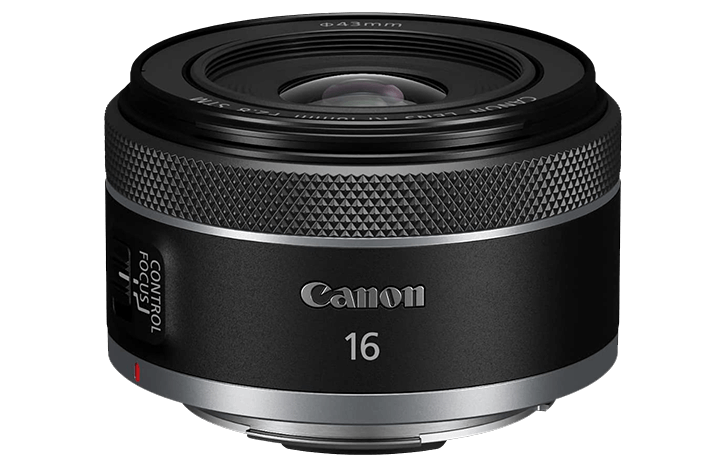One of my favourite lens reviewers Christopher Frost has completed his review of the brand new Canon RF 16mm f/2.8 STM.
The review showcases all of the strengths and weaknesses of Canon's new $300 prime lens for the RF mount. Keep realistic expectations for this little lens, it is $300 after all.
Interestingly, you cannot turn off distortion correction in your EOS R body with this lens. Canon has decided to use the camera body to make up for optical weaknesses, which is probably just fine for most applications.
Canon RF 16mm f/2.8 STM Key Features
- First ultra-wide-angle, fixed focal length RF lens
- High image quality and bright, fixed f/2.8 maximum aperture
- A stepping motor (gear-type STM) that provides smooth & quiet continuous AF during video recording
- Supremely lightweight and compact, for an ultra-wide lens for full-frame cameras
- Minimum focusing distance of 5.11 inches and a maximum magnification of 0.26x
- Control/Focusing Ring can directly adjust numerous settings
- Fixed Focal Length: Focal Length: 16mm
- Lens Type: Wide Angle Lens
Some of our articles may include affiliate links. If you purchase through these links, we may earn an affiliate commission at no extra cost to you.


Wasn't the RF mount supposed to allow easier engineering of better designs without these optical weaknesses? Watching this review, the way the focus sounds like the original nifty fifty... It feels like they just slapped this together for lowest possible cost.
Meanwhile, I'm kicking myself. Two years ago I had a chance to purchase a 24-70 F/4 for $550, and I thought... meh, that's kinda pricey. Now it's going for $1200 on ebay from reputable places. The 16-35 F/4 is also skyrocketing. Maybe supply disruptions are a part of this, but there's still so much demand in good EF lenses, and they're optically no worse than the RF versions. Is Canon leaving money on the table?
My pre-order is in-store now, I’ll be picking it up on Thursday this week. I didn’t expect this lens to compete with my Sigma 14-24 f/2.8 but for a cheap compact wide lens that you’ll hardly know you have on your camera and isn’t going to put your back out when using it, I can live with its spots and pimples.
Then again, those $100,000 Mercedes S-class sedans drive like crap with all the computerized traction control systems turned off. Can't Mercedes design a decent car anymore? I also hear the U.S. Air Force has some planes that won't even fly without computers ensuring stability. Talk about a step backward! Why can't they all be as smart as me and design things right?
I do hope Canon develops more lenses in this spirit. For example, it'd be nice if they made an R-mount version of the classic 50/1.4 with double-gauss design rather than the big heavy Sigma 50/1.4 versions. All that would be needed is a modern AF motor, improved coatings, and perhaps a tweak to the optical formula. Yes I know we already have a 50/1.8 in R mount but 1.4 would be nice.
Now they have a near-complete set of exotic L glass AND an excellent selection of budget glass covering everything from 16mm to 800mm. And some people still complain…:rolleyes:
This is a $300 lens, it’s pretty unrealistic to expect it to be as smooth and quiet in operation as an L lens.
It’s designed to be a *cheap* and pocketable lens that can be carried at all times and takes up virtually no space in a camera bag.
Sure, they could easily have put a few more elements in the lens and avoided the need for computational aberration correction, they could also have put in a better focus motor, and included optical stabilisation. But if they did it would weigh 5 times as much and cost 5 times more.
I am glad that my G5X II doesn’t have the extra pound of glass it would take to correct the little lens to an acceptable level without software corrections. I bet the owners of the little 16mm lens will feel the same way.
For selfie I don’t care about corner sharpness, but all other aberrations are perfectly controlled.
For astro I won’t use the lens corrections but light frames to deal with vignetting .. no one cares about straight lines for Milky Way photography so I actually get sharpness and contrast where I need it. Coma is fairly okay, worst case I have to stop it down to f4 .. still better then the EF 16-35mm f4L for Milky Way I reckon, it had more aberrations traded for better corner sharpness.
Big plus for the smooth bokeh and close focusing distance!
most annoying is actually the lack of weather proofing, despite its small size I’d like to leave it out for Astro for a couple of hours and don’t have to take it down during a small drizzle.
It’s nice to listen to people who can produce a video without jumping up and down shouting “BREAKING NEWS!” like Tony Northrup, and without jabbering at 20 words per second, waving their arms all over the place and talking nonsense like Kai.
Having said that, I do find Jared Polin to be very informative and entertaining, and I have a soft spot for Chris and Jordan on dpreview.
The size and weight of this means when I travel it can come everywhere and just be used when something is too wide for the RF 35mm!
Thanks
This one is not good.